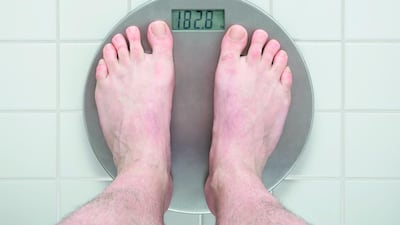UAE doctors are hoping that a new weight-loss drug, which is now available in the country, will help to improve the lives of people suffering from Type 2 diabetes.
Mounjaro, also known as Tirzepatide, is a US Food and Drug Administration-approved injectable prescription medication that is used to improve blood sugar, or glucose, through weight loss.
Developed by American drug producer Eli Lilly and approved in May 2022, Tirzepatide was found to reduce body weight up to 22.5 per cent by decreasing appetite after mimicking the effect of hormones released in the body after a person eats.
King’s College London Diabetes, Endocrine and Obesity Institute, Dubai
Globally, Type 2 is the most common type of diabetes, accounting for around 90 per cent of all diabetes cases. In the UAE, it is one of the most common diseases.
Doctors are using the drug as a second line of treatment and recommend a healthy diet and lifestyle management first for significantly overweight people.
The injection has been available at Dubai’s King’s College Hospital since early August. Other hospitals, such as Prime Hospital, now also have it.
The cost of the treatment is Dh400 per week or Dh1,700 per month.
Doctors usually prescribe one injection every week but the dosage depends on the patient’s profile.
Dr Emran Ghaffar Khan, director of the King’s College London Diabetes, Endocrine and Obesity Institute in Dubai Hills, said that the drug is believed to be much more effective than other previously available medications.
He has 13 patients so far who are on the treatment and will be reviewing them regularly to see how much of a difference the medication is making.
“In my view, it's ground-breaking compared to the others,” he told The National.
“We start off with lifestyle, psychological and nutritional support.
“But when they’re not able to achieve what is required, then the help is now available in the form of medication.
“We start with 2.5 milligrams, and we build it up slowly on a monthly basis, and then it goes up to 15 mg.
“Every time you go up, there is weight reduction in the process.”
How does it work?
Semaglutide and Liriglutide are some common medications that are used to treat diabetes.
These all work on the GLP-1 receptors in the body ― receptor proteins in cells that help to control blood sugar levels by enhancing insulin secretion.
However, Tirzepitide works both on GLP-1 and another receptor called Glucose Dependent Insulinotropic peptide (GIP), a hormone released from the small intestine that enhances the release of insulin following the intake of food.
This helps to mimic the effect of hormones released in the body after a person eats and decreases appetite.
“The weight loss can be about 22.5 per cent of the body weight for some patients and account for potentially 25 kilograms' weight loss in patients in a 100kg person,” Dr Khan said.
Can it also be used by non-diabetic overweight people?
Dr Anil Kumar Puru Naranyanaswamy, consultant endocrinologist and chair of medicine at Prime Hospital, said that the drug was used only for those suffering from Type 2 diabetes, and not those who are non-diabetic overweight people.
“Obviously, the first line is lifestyle, and then it can be used from the second line to the last line as well. So, it's quite varied,” he said.
“And because it's got significant weight loss, there is improvement in the other metabolic syndromes like blood pressure and the lipid profile.”
There is continuing research in the US to see how non-diabetic people that are overweight react to the drug — and if it can be used by those looking to use the drug simply to lose weight.
Have there been clinical trials?
In May, the results of clinical trials involving 2,359 patients were released.
Some were given 5mg, 10mg or 15mg treatment regimes of the drug.
For the lowest dose, average weight loss was 15 per cent of body weight; in the 10mg group, it was 19.5 per cent; and in the 15mg group, 20.9 per cent. Among patients given a placebo, average weight loss was 3.1 per cent of body weight.
Dr Jeff Emmick, Eli Lilly’s vice president of product development, said the drug was the first to achieve an average weight loss of more than 20 per cent in a late-stage trial.
Almost two-thirds of those on the highest dose lost at least 20 per cent of their body weight.
Dr Khan shared a case study of an Emirati patient he is treating.
The 56-year-old has long-standing Type 2 diabetes, which remains uncontrolled on multiple oral medications and insulin injections.
“He also has a weight problem which he has been struggling with for many years,” he said.
“In spite of all his efforts to exercise, he has not been able to achieve [weight loss].
“We had a long discussion and decided to start him on this new medication.
“The initial feedback is good, however, and I will be reviewing him regularly to adjust his medication and to ensure that his diabetic control is improved and his weight goes down.”

















